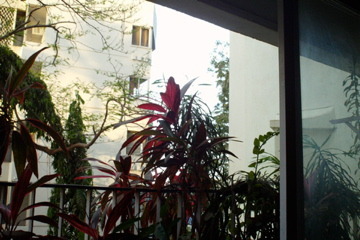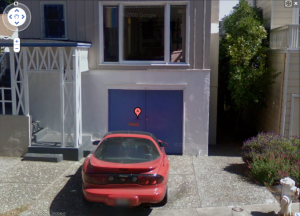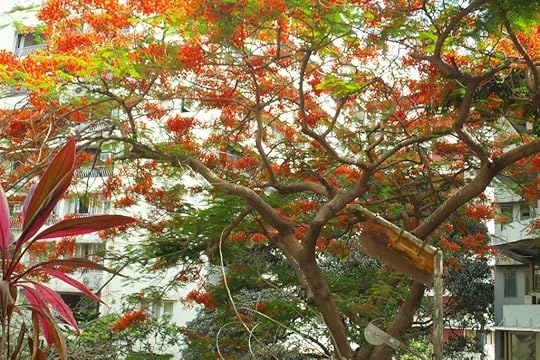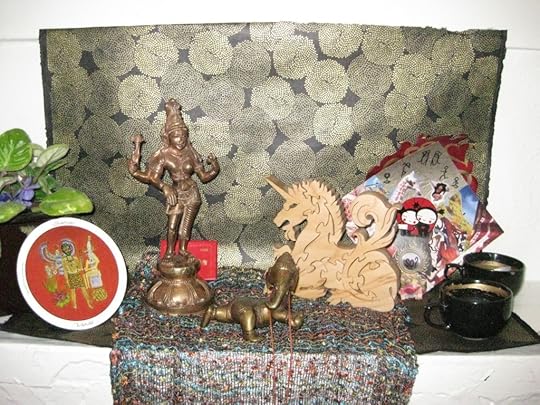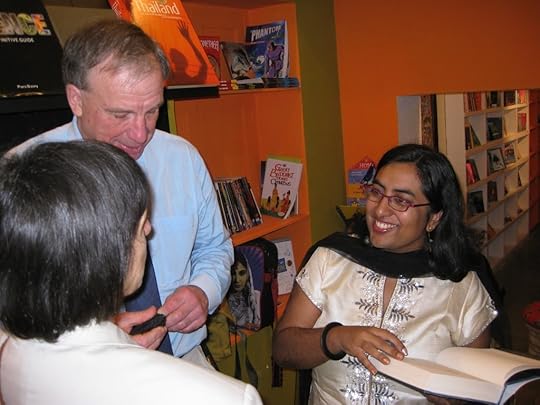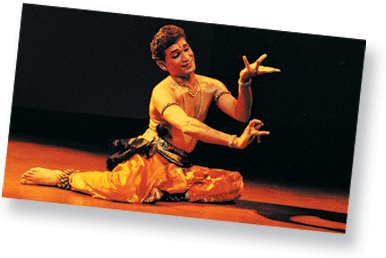Minal Hajratwala's Blog, page 7
June 20, 2011
Today I moved
Goodbye, apartment
Reading my favorite beatnik Punjabi's blog made me think of the ziplocs Rivka brought me this morning. She has moved continents twice and knew exactly where to buy them in the neighborhood (next to Twinkle at Kemps Corner, in case you need some too) so she volunteered to get some and bring them to me. This was so incredibly helpful that I felt moved by her generosity.
This is only symbolic of many other people helping me — S bringing her car from a distant suburb and agreeing to store several suitcases for me, V carrying a load up three flights of stairs, various people offering guestrooms and leads on apartments and so on.
Rivka brought 15 ziplocs each in 3 sizes:
• small for opened bottles of toiletries
• medium for some more of that kind of stuff — so boring I don't even remember what it is
• large for packing clothes and papers to keep them from molding in the monsoon
This last was the most interesting to me, because new, and possibly futile.
I had lots of bags left over and felt greedy about giving them up, in case I need them again. So for now I am wealthy in ziplocs.
My moving-out and moving-on was rather sudden, precipitated by my landlord nonconsensually moving in with me and refusing to commit to a leaving date. Because of several complex factors (including whiskey, cocaine, entitlement, verbal diarrhea, and patriarchy) I did not wish to be his flatmate so I have been staying at yet another generous friend's place while she has been out of town for the past several weeks. She is coming back, plus eventually it becomes ridiculous to pay rent for non-habitation, so I decided to stop clinging to the idea of what that place could have been for me, realize it was not actually being that, and leave.
It was kind of a tough decision but now that it's done, I feel a sense of freedom and excitement and readiness to make another transition — I have just 7 more weeks in India, for now, so life is about to start moving very fast.
On Friday I will go to Bangalore … also a rather quick decision and a great one. It feels like an awesome time to embrace spontaneity. I am totally a planner and list-maker, so although from the outside it might look like I do big things suddenly, actually usually I do tons of planning ahead. Not so right now.
I suspect the monsoon as well as the phenomenon of three eclipses within six weeks (last one coming up July 1) is contributing to my newfound semi-recklessness.
At the beginning of the rains I tried to not go out in the rain. It seemed wise since the lane that I could see from the window was like a little creek. However after three solid days of rain I had to reconsider that practice.
One evening after I talked with my landlord I had a lot of excess energy — too much even to channel into using all my new Hindi curse words — so I went for a brisk walk and got caught in a suddenly squall and got absolutely drenched and walked more and waded through puddles and stopped to eat momos and a brownie and walked back and it was rather wonderful. When I came in, I washed my feet.
Today was terribly hot and sticky while we were moving stuff, but not raining, which was lucky; but then it did rain suddenly; but then it stopped.
Wisdom O The Day: Trying to avoid the monsoon while it is actually happening is silly.
Someone told me this is actually pre-monsoon. "This is nothing yet," she said. Other people had told the same about the summer heat — "This is nothing yet" — but then it didn't get hotter. Now I hear it was a very mild summer: "That was nothing." I am not sure what to make of all these narratives of nothingness.
I'm not sure this weather metaphor can really stretch any further but it is interesting to think about my calendar in terms of certain and uncertain periods right now.
• go to Bangalore June 24
• ??? back in Mumbai — stay with friends
• leave India August 7
• speak in Detroit to journalists about how to get a book published on August 12
• ??? do a fundraising event for DesiLit in Chicago ???
• speak at the Commonwealth Club of San Francisco on August 25 (my talk: "India and Her Fragments: Migrations from Old to New Worlds")
• ??? 2 ½ months of some stuff ??? Work, apply for grants, write, ???
• return to India November 26
• ???
I suspect very interesting things will happen in the ??? periods. They always do.
Salla — who, as my temporary roommate obviously chosen by destiny, has witnessed all my decision-making contortions — always smiles very sweetly and says, "Yes, why not?" Then she says something very smart and insightful that helps me see what I'm doing or need to do.
The other night we watched a video of Judith Butler's lecture on anarchism and Israel, and drank rum with nimbu paani, and looked at Google Maps Street View, zooming in on the closeups of her mum standing in the driveway of their home in Finland and of the apartment where I lived in San Francisco with my red Firebird parked in front of it.
I made a spreadsheet that shows me where I will be sleeping each night for the next 7 weeks. The dates I still need to confirm are marked in yellow. I named the document Monsoon Tour.xls.
Tomorrow I will pick up Nandi's key and visit with her over lunch, go with Salla to her tailor to get my fabrics from Kutch stitched, and have Lata come over to give me a massage and a manicure and pedicure.
All is well or, as the theme song for "3 Idiots" has it, Aal Izz Well.
June 13, 2011
A Thousand Sighs: Memoir of a Hoax
Download Amina Abdullah Arraf's fake memoir here: A Thousand Sighs- Part I.pdf

On May 9, a friend of a friend sent an email to me and two other women writers asking if we would help a young lesbian, a Syrian American political blogger, to find a literary agent for her memoir. He pointed us toward this powerful post.
According to her blog, Amina Abdullah Arraf was on the run in Syria, he said. Though he'd never met her, this kind man was moved to try and help her.
We had a short email exchange in which I offered some standard publishing advice and named three agents who might be interested. I soon received the following email from aminaarraf@gmail.com :
Hi Minal,
I've attached a section of my book in progress … if you can forward
to [name deleted], I'd be very appreciative. You can also send her to
my blog: http://damascusgaygirl.blogspot.com/
I really have no idea at all about the business end of things …
Amina
The attached document was titled "A Thousand Sighs, and a Sigh: An Arab American Education." I skimmed it, found it rambling and in need of a lot of work, and did not forward it to the agent — probably the best decision I made in this whole process. Instead I offered some editorial feedback via my friend's friend, and did not hear back.
Last week, when I saw the story that Amina had been abducted, I wrote an email to Lambda Literary, the queer writers' organization. I suggested that the organization get involved in some effort to assist Amina and offered my help.
As the whole world knows today, there is no Amina. Countless people, moved by compassion, wasted much more time and energy than I did on a spectre.
This spectre was more than a cynical act of manipulation, however.
Amina was an idealized projection, the white man's fantasy of an oppressed yet courageous Arab women. Bright, reckless, courageous, American, fighting patriarchy and Islamic repression at once: She was the perfect superhero, the perfect wet dream.
It is ironic that the hoaxster, in his mea culpa, says he wanted to contest "the pervasiveness of new forms of liberal Orientalism."
For that is the very genre in which he chose to express his literary pretensions. By inventing this persona, creating an elaborate blog, and — apparently — intending to pursue book publication, Tom MacMaster was well on his way to pioneering "new forms of liberal Orientalism."
Today I have read the autobiography much more carefully than I did the first time. The faked lesbian sex scenes turn my stomach. The narcissistic writing, the sprinkling of quotations from the Qu'ran and tidbits from Syrian history, the stock stories compiled from a thousand news clippings — it all seems painfully obvious.
So I find myself among the countless people — among them journalists for many (though not all) of the world's most respected news organizations — who today are kicking themselves for believing, and trying to help.
Here are some excerpts from the memoir:
Of Amina's ancestors, whose stories are told in long passages of pseudo-fantasy-novel style:
Now, Hajj Musa tried to take Nashqua to his bed for she enraptured him. She refused him, saying that, though she was a servant now, she had been born free in her own land and was of an ancient noble lineage; if he would have her, he would need first to ask for her hand and do all things properly. She was no slave and would be no man's doxy.
Amina as a child, while her family is fleeing Syria:
"I ask, is America near the sea? I'd like to see the sea …"
"Yes, you will see the sea …"
Growing up in the United States, a perfect model minority girl:
I was almost always the first one done with tests, the one who had her hand up first with the answers and so on. (If you've ever seen the Simpsons, I was a lot like Lisa though with less self-confidence.) I took standardized tests and did ridiculously well on them (I'm still more than a little embarrassed about my listed IQ).
Her first crush on a woman (white, of course):
The whole time, I was noticing how mature and pretty she was; long, wavy golden hair tied up in a bun, bright blue eyes, an almost pinkish face and a woman's body, just the way that I wished that I looked.
An exchange with her father, during her adolescence:
"Remember, Amina," he sent [SIC], waving a finger, "if the young man and the young woman are alone together, the Shaitan makes three!"
"Yes, dad," I nodded. "No Shaitan, I got it."
When she realizes she is a lesbian:
I couldn't help but think of myself as evil, foul, a sinner, and a corrupter …
And it goes on.
A thousand sighs, indeed.
June 5, 2011
For parents/families/friends of desi LGBT people
Hi friends,
A quick post to share two resources.
1)
A Mumbai-based parent whose daughter is a lesbian is starting a support group for desi families and friends. Parents, relatives, and friends of people who are lesbian, gay, bisexual, or transgender — as well as anyone who identifies as LGBT who would like to collaborate in developing this process of dialog — can email her at familyandfriends@queer-ink.com.
Please feel free to share this contact information widely.
All emails and identities will be kept confidential.
I am so excited about this because I've gotten to know this mom, Chitra Palekar, a little bit, and her enthusiasm for this issue is wonderful. She is one of a group of parents who signed a petition as part of the legal case to decriminalize homosexuality in India. She has done several media interviews to help promote the legal cause; on CNN here recently, she debated (and demolished) a rightwing pundit who tried to say homosexuality is against 'family values' — by discussing her own family, and modeling love and support for her own daughter who was there with her. She is an acclaimed Marathi filmmaker herself.
To read a brief article about Chitra's journey, click here.
The idea of a group for parents/families has been a topic of conversation and ideas for at least as long as I've been out (20 years!), and even longer I'm sure. I think it's wonderful that there is now a parent who is taking public leadership on this topic.
2)
I also want to recommend the new award-winning documentary, "I Am" by Sonali Gulati:
I Am chronicles the journey of an Indian lesbian filmmaker who returns to Delhi, eleven years later, to re-open what was once home, and finally confronts the loss of her mother whom she never came out to. As she meets and speaks to parents of other gay and lesbian Indians, she pieces together the fabric of what family truly means, in a landscape where being gay was until recently a criminal and punishable offense.
The film is currently making the rounds and there are screenings all over the world in June, July, and August 2011. For dates and locations, as well as to see the beautiful trailer for the film, click here.
As one of the reviews of Sonali's film notes, the take-home point is when the mother of one of the queer young people proclaims: It is "not necessary that you be alone."
May 31, 2011
"The Joy of Life"
Last weekend I introduced a retrospective of
*
Good afternoon, thank you for coming. I feel honored to have been asked to introduce this program of films, "The Streets of San Francisco," set in my beautiful hometown.
With this retrospective, Kashish honors both Jenni Olson's vision as a filmmaker and her longtime contribution and commitment to the lesbian, gay, bisexual, and transgender film community. She has been an instrumental figure in the United States in creating organizations and infrastructure for queer culture. While still a student back in 1986, she founded an LGBT film festival at her university campus. She later became co-director of the San Francisco International Lesbian and Gay Film Festival and was a co-founder of the website PlanetOut.com, as well as of the queer gathering at the Sundance Film Festival. She's now director of e-commerce at the world's largest exclusive distributor of gay and lesbian films. The books she has authored are both critical to documenting and preserving queer film culture: The Ultimate Guide to Lesbian & Gay Film and Video and The Queer Movie Poster Book.
Creatively, Jenni Olson's first films were documentary feature-length films that compiled vintage movie trailers with queer content. The first one was called Homo Promo and the latest is Bride of Trailer Camp. We aren't showing these films today, but you can see some very entertaining samples on her website, www.butch.org.
Today's program begins with a few shorts in which you see her signature style develop. The main feature is a documentary called "The Joy of Life," and here is where we see Jenni Olson's unique vision as a filmmaker really emerge. I think of it less as a movie, with lots of action and naacha gaana [song and dance] going on—in fact there are almost no people in it— and almost more like a photo album with a story. It reminds me of sitting in someone's living room in San Francisco, looking out the bay windows, having several cups of tea and listening to a friend talk about what's going on with her: "Well, you know, there's this girl … It's been kind of hard …" [here the Kashish audience laughed].
"The Joy of Life" has three parts. The first is an apparently meandering story about queer relationships narrated by Harry (Harriet) Dodge, who is another key figure in American queer culture. Then there is a poem by Lawrence Ferlinghetti, a San Francisco poet of the Beat generation, about the city, which acts as a sort of bridge. And then there is the story of the Golden Gate Bridge, where more than 30 people a year jump to their deaths every year.
This film was quite influential, along with another film ("The Bridge" by Eric Steel) that came out soon afterward, in getting the bureaucracy in charge of the bridge to reconsider the safety of the bridge. I can speak more about that afterward during the q&a if you're interested.
Jenni Olson made this film after her co-director at the San Francisco International Lesbian and Gay Film Festival, Mark Finch, killed himself by jumping off the bridge. In my perception, linking queerness and suicide is very much at the heart of this project, but in a very subtle, never didactic way.
Last night I had a chance to touch base (thanks, Facebook!) with Jenni Olson and asked her if she wanted to share a few words with you. This is what she said:
I am honored to have my work included in such an important and prestigious film festival. I want to say Thank You in advance for your thoughtful attention to my unique cinematic approach — prioritizing urban landscapes and voiceover as my preferred method of storytelling. I hope you enjoy this meditative viewing experience and would love to hear your impressions if you want to look me up online at butch@butch.org!
With that, please relax and enjoy the film.
*
Here is the official film trailer. You can read more about "The Joy of Life" here or buy it here.
May 30, 2011
Nondualism: Writing/Not Writing
I've been writing about my writing process over at the Hedgebrook blog.
Here's my post on regret, reality, desire …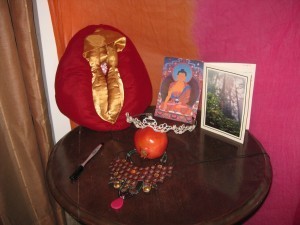
Altar, Mumbai, April 2011
May 27, 2011
The Writer's Clock
I wrote about time, writing, trauma, re-enactment, obsession, and a unicorn dream … over at the Hedgebrook Writes blog. Read women writers on writing, including the awesome Ruth Ozeki.
May 1, 2011
Unicorn Is My Gender
Since November 2009, I've been writing a cache (herd? posse? coven?) of top-secret poems about unicorns. This post contains a sneak preview!
But first here's a picture for you, from the Metropolitan Museum of Art collection:
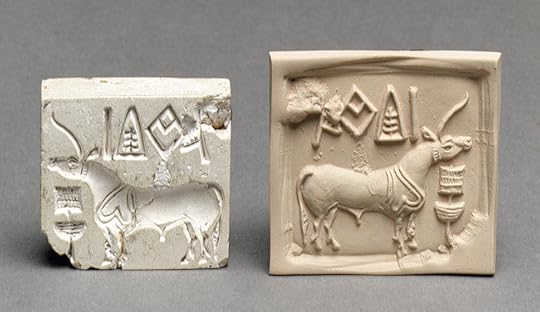
Unicorn seal and impression from Indus Valley, ca. 2600–1900 BCE
The Indus Valley civilization, four thousand years old, was home to the world's earliest images of one-horned equines. Yes, it's true; unicorns were not invented by medieval Europeans. Or even Lisa Frank.
My unicorn research led me on an amazing expedition last month to Dholavira, one of the archaeological sites where hundred of unicorn images were unearthed in the 1990s. I'm also delving into sources as diverse as Audre Lorde, Aristotle, Lady Gaga, Jean Genet, and, er, Private Wealth magazine. Unicorn thinking, as I've come to conceptualize it, has also instigated many stunning journeys, internal and external—as well as startling coincidences too beautiful and numerous to outline here.
The first coincidence, though, is that when I began writing poems about unicorns, I didn't even know about the South Asia connection. In fact, I thought I was getting away from all that deep "roots" type writing that I'd just spent eight years focusing on; I thought it'd be fun to do something else for a change.
Very cute, universe!
Some of the qualities of unicorns, and unicorn thinking, that I've come to appreciate include surprise, journey, magic, purity (a difficult term), risk, depth, courage, borderlands, transcendence, queerness, transformation, femininity (another tough one), openness, vulnerability, intimacy (maybe the toughest!), and ecstasy.
I feel fortunate that many, many friends and acquaintances have indulged me by sending me unicorn links and sources and especially videos. The videos have inspired me to create—dare I say "curate"?—my first YouTube channel. From narwhals to Lady Gaga, from Disney cartoons to German feminism, the Unicorn Is My Gender channel offers you (ok, me) hours of unicorn viewing pleasure.
As this writing continues to unfold (a verb that makes me think of unicorn origami), I'm happy to share one of the poems in the sequence.
*
Operation Unicorn: Queries
For instance do they sleep standing
or kneel
as if worship, as if open mouth
or like fish rest in episodes unrecognizable to us
spinning
through what they breathe, emerald air?
Do they pant? eat/shit? Give birth in viscera
& bone,
hail, flame, all five elements harmonious as hellebore?
Who is their mother, their goddess, their
Eve? What
power do they honor above all?
Why have they come to us now?
*
Thanks Kristy Lin Billuni, Miriam Kronberg, Julius Paras, Jeff Stroker, Ann Ueda, Ravi Chandra, Irene Nexica, Nancy Kates, Nancy Netherland, Bhanu Kapil, Kuzhali Manickavel, Sueann Mark, Kabi Sherman, Kirthi Nath, the women of Hedgebrook, and many many others for pointing me toward unicorns. Keep em coming.
March 19, 2011
Everything I Know About YOUR Fulbright Chances
Dear smartypants,
Guess what, I think Uncle Sam wants to pay YOU to come to India! Or vice versa!
So I was just at the big Fulbright mid-fellowship shindig in Goa, where all the U.S. scholars based in these parts gathered in order to drink cocktails by the pool, um, I mean, to share the results of our extremely serious and significant projects. Except for the afternoon beach tour and the selection of three desserts at every meal and the hotel spa, it was all work, work, work!
On the first morning, the program officer from the U.S State Department appealed to us to recruit applicants. She said they are "desperately seeking" future Fulbrighters.
Funding has tripled in the last few years in this region. In 2008, 46 Fulbrighters came to India; next year, it'll be 150. Meanwhile, the number of applicants is what it's always been. Similar expansion of funding for Indians to do projects in the U.S. has taken place. Your chances right now are better than they've ever been.
That means you have a better chance now than ever to get the government to fund your project in India, Bangladesh, Bhutan, Kazakhstan, Kyrgyz Republic, Maldives, Nepal, Pakistan, Sri Lanka, Tajikistan, Kazakhstan, or Turkmenistan. (Not Absurdistan, though.) Want to go to more than one country? You can apply for a regional fellowship, too.
OR, if you're a citizen of India or one of those other countries and want to propose a project in the United States, this is also a great time.
So if you think you would like to do a project overseas for 2 months or more, check out the Fulbrights. Awards are given to 8,000 Americans a year in 150 countries, in almost every field of endeavor, and an equal number of foreign scholars get to travel to America to study or teach. I'm going to focus in this blog post on India, because that's what I know the most about, but hope there will be some useful information for people applying to other countries too.
I'm not an expert and there's a lot of complicated information, different deadlines, etc., so you will definitely need to do your own homework. But I'm hoping this post will be helpful as a starting point and as encouragement.
Whoa, so many Fulbright websites! Where do I start?
I know, right? OK, here:
If you're a U.S. citizen student or recent graduate, start here.
If you're a U.S. citizen who is a working artist, professional, or faculty member, you're a "Scholar" in Fulbright terms; start here.
If you live outside the US, you might be eligible for a Fulbright to come to the US temporarily. Students, start here. Faculty, professionals, working artists, again you are Scholars so start here. If you could teach a foreign language to students in the United States, start here.
Not sure which level to go for? The Scholar level carries significantly more money. The student/recent graduate level has requirements for timing and degrees. See which one fits you best. Don't assume the student level will be less competitive; many universities have well-oiled machines helping their students to apply for these fellowships, so you might have just as good a chance applying as a Scholar.
For India-specific information, either as an Indian or as an American, there is also good info on the website of the organization that administers the India programs: click here.
Once you're inside the proper site, look for the searchable database. You can search by country, academic discipline, etc.
How long will the application take me?
I don't know because there are so many different programs.
For the one I applied to, the requirements were relatively simple: a five-page project proposal, CV, bibliography, and three letters of recommendation.
For students, it's a more complicated process and requires contact with institutions overseas as well.
Can an artist get a Fulbright? Don't you have to be an academic?
There are sculptors, musicians, filmmakers, visual artists, and writers among the current Fulbrighters. You do not have to have a faculty position at home (I don't), but you will be assigned an academic affiliation in your host country.
What exactly does Fulbright fund?
The amount and type of funding really varies depending on the country, the exact award, and your level (student or scholar, research or teaching, etc.).
In general there are research awards, lecturing awards, and combined research/lecturing awards.
Some countries allow any academic discipline (like India) while others are very specific in what skills/areas they want.
Generally there is a monthly amount for living and research expenses, plus some special supplements for other categories. If you have dependents, they can also travel with you and you get a stipend for them.
How do I write a strong application?
• Check out the Fulbright web seminars on this topic, as well as country-specific seminars: http://www.cies.org/Webinar/ . If you are near a university, the campus may also have Fulbright workshops around this time of year.
• This is a government-funded program that requires the approval of all the countries you plan to visit. It's not going to support you in researching your master plan to overthrow the nation-state. In India, certain topics (such as Naxalites) and geographic areas (such as Kashmir) are off-limits. You are still your awesome revolutionary self, but do figure out what the taboos are for your countries and avoid them.
• Also keep in mind the purpose of the Fulbright is to promote mutual understanding. If you get an award you will hear the words "cultural ambassador" ad nauseum. Don't patronize, but if you can build some language into your proposal about how your project will further these causes, it'll probably go over well.
• Have a clear, focused, cohesive project for either research, teaching, or both. Be really clear about your topic, methods, and outcomes. Know as much as possible about the country where you want to go, and about other people doing work in your area of study.
• Start early. Talk to people about your project and get feedback. Call the program officer assigned to your area (listed on the websites above); they are super approachable, and part of their job is to help you craft a strong application. You can brainstorm ideas or get feedback on your idea from the program officer. Go to Fulbright seminars in your city or campus or tune into a "webinar." Start approaching people for your letters of recommendation now.
• Write and rewrite your drafts. This is kind of "duh," but duh. Write a draft. Get feedback. Rewrite it. Then do it again. And don't do it at the last minute.
• Browse current projects going on in the country where you'd like to apply. If you aren't sure where to find that information, ask your area program officer. See current US scholars in India here.
• Read the fine print. Yes, there's a lot of it. Read it.
Who should write my letters? Will you write one?
Your three letter writers should (a) know your work intimately and (b) be experts in your field. If they are former Fulbrighters, that can be helpful, too. Try to get a good mix of people who can vouch for different aspects of your qualifications. You should send them a draft of your proposal early on, give them plenty of lead time, and tell them what you want them to say.
Some awards require you to have a letter of invitation from an academic institution in your host country. Even if this isn't required, it may strengthen your application to show that you have connections abroad who support your project. Again, start early.
You may find that you need to supply a draft letter to your recommenders. If so, highlight your accomplishments and the worthiness, originality, and significance of your project. Mention how they know you and your work. Try not to be overly modest or overly effusive. Get a friend to read it for tone if you need an objective point of view.
I probably won't write you a letter. Except for those of you who already know I will. 
I don't have a PhD. Can I still apply?
Yes. I only have a bachelor's degree. For the Scholar level, you need a "terminal degree" in your field OR the professional equivalent. I argued, successfully, that all my writing and research experience added up to the equivalent of an MFA or PhD, and I asked my letter writers to emphasize this point as well. It worked.
I have more questions for you!
Great! Please ask them in the comments area, and I'll try to answer for everyone's benefit.
What else can you do for me?
Well, I suppose that depends on what YOU would like to do for me. 
If you'd like to hire me to edit or critique your proposal, we can talk about that.
If you'd just like to see my proposal as a sample, feel free to email me, and I'll send it to you.
I also encourage you to find other people in your field who have successfully obtained Fulbrights and ask if they wouldn't mind sharing their applications as samples, too. This was the single most helpful thing that people did for me, because it helped me see how to frame my ideas into a successful proposal.
Fulbrighters hard at work:
Fulbright Distinguished Fellow Paul Joseph and international whistling champion Linda Schiffman stopped by my Chennai book reading, co-sponsored by USIEF
February 7, 2011
Call for Submissions: Queer Indian Stories
I'm very excited to be editing a new anthology of contemporary LGBT writings in India. The first deadline for queries from writers will be March 15. Please do share with anyone you think might be interested — writers, communities, listserves, etc.!
Queer Ink announces
An Invitation to Writers
to submit to
The Queer Ink Anthology:
Contemporary LGBT Stories of India
Queer Ink, India's first online bookstore (www.Queer-Ink.com) for everything queer, seeks YOUR stories for an exciting new anthology of diverse, contemporary LGBT/queer stories.
Building on the work of other groundbreaking historical anthologies, we are seeking dynamic stories of people living in India today who identify as lesbian, gay, bisexual, transgender, hijra, kothi, queer, genderqueer, or other gender-non-conforming identities.
Stories may be fiction or nonfiction. Writers may be of any gender identity as long as the story features a primary character who is queer. Rural or urban, gritty or sunny, Mills & Boon or Midnight's Children — all writing styles and experiences are invited. Diaspora writings are also welcome as long as there is a strong connection to India in the main character's life. Excerpts from longer works (novels, memoirs) are welcome but must be able to stand alone.
We will be seeking a mix of established and emerging writers. A panel of editors/curators led by Minal Hajratwala (award-winning author of Leaving India: My Family's Journey From Five Villages to Five Continents) will select the stories.
We welcome regional language submissions and, for selected stories, will work with authors and translators to create English versions. The anthology will be in English.
All accepted stories will go through a professional editing process in which writers will retain ultimate control of story content.
Writers will be paid 1,000 rupees per story plus two copies of the anthology.
Guidelines for Submission
Please email anthology@queer-ink.com no later than March 15, 2011, with the following:
• 200-word description (synopsis) of your story. (This description should be in English and state the language of the original story, if other than English.)
• Your name*
• Your pen name, for publication purposes, if different
• Email address
• Phone number
• City, state, and country of current residence
• Brief biographical statement about you (1-2 sentences)
Our strong editorial preference is for unpublished works, but we will consider stories that have been published in a very small circulation publication or website, or a non-English publication. Please disclose any prior publications in your email.

(OPTIONAL) If completed, you may also attach the full story. Please follow these guidelines closely: Use a standard font, 12 point, double-spaced type. Include the word count of your story on the first page. On every page, please include your name (or pen name), story title, and page number. Submit your story as a .doc or .rtf file — all other other file types will not be opened.
If you prefer to submit by mail, please send to: P.O Box 7623, Malad (W), Mumbai 400.064.
Mailed submissions must be postmarked by March 15, 2011.
We will contact you by April 1 if we are interested in seeing the full story.
Completed stories will be due by April 30, 2011.
*A NOTE ON ANONYMITY:
We welcome submissions by writers who prefer to use a different name in print. If your story is selected, we will need your real name for legal purposes, including copyright and payments. We will keep your name 100% confidential if you prefer.
Still have questions? Please email us at anthology @ queer-ink.com .
January 8, 2011
Chennai impressions
Chennai expanded my mind with sounds, possibilities, art! Some impressions: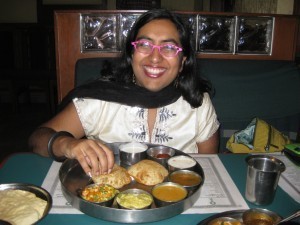
*
Trying to ignore the loudspeaker right outside my hotel room, which backs onto a five-star hotel's parking lot, booming with strings of numbers and letters called out to summon drivers when their passengers are ready to go somewhere.
*
Befriending the Brazilian ex-dancer who wears beautiful saris to the performances every day, who's braving India for the first time, and who spent two hours in a rickshaw today because the driver couldn't find where she wanted to go and she didn't know how to direct him.
*
Admiring the strange, surreal costuming of the Kathakali drama. (Picture a man in green face paint, a large golden headdress, and a hoop skirt … yes, that's the villain.)
*
Dreaming vividly … last night, being seated in a restaurant amid flowing rivers.
*
Feeling famous … getting recognized in public twice in one day, after this article appeared on page 2 of the Times of India Chennai edition.
*
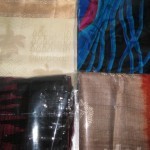 Buying saris by myself for the very first time, from the very nice folks at Tulsi Silks in Mylapore.
Buying saris by myself for the very first time, from the very nice folks at Tulsi Silks in Mylapore.
*
Meeting S. Muthiah, the eminent South Indian historian, who told me Leaving India was the best book he'd read in the last three years. Who knew an 80-year-old gentleman could make me feel so warm & fuzzy?
*
Listening to Lydia, who was in town to perform at the All-India Whistling Convention, whistle a selection from Verdi's Rigoletto.
*
Doing a fun conversation/reading at Full Circle Bookstore attended by a great audience of 50-60 people, including journalists, queer community, consulate friends, Fulbrighters, book group ladies, scholars, & readers with lovely, smart questions.
*
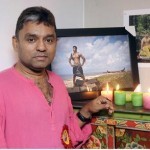 Eating a fabulous South Indian thali while talking with Sunil Menon, one of my activist heroes, a pioneer of HIV/queer organizing in India.
Eating a fabulous South Indian thali while talking with Sunil Menon, one of my activist heroes, a pioneer of HIV/queer organizing in India.
*
Immersing in a week of amazing performances in the annual dance and music festival … taking pages and pages of notes and feeling ideas for my novel flow … way more than I can possibly describe.
*
Inventing the chikku-lime smoothie, with the collaboration of the juice guy at the Music Academy canteen (and getting others to order it too). Recipe: 3-4 chikus, 2 sweet limes, 2 spoons sugar, yum!
*
Meeting old and new friends … chance encounters with people I know (a writer from Michigan, a dancer from San Francisco, an activist from Seattle) and beautiful new connections with people I met here.
*
Reading newspapers' music reviews, realizing it would take me another lifetime or two to understand passages like: "As a contrast, he rendered 'Ni Dayarada' the Vasanthabhairavi raga kriti of Tyagaraja in durita kalam. The raga alapana of Shanmughapriya for the RTP was grand, with all its sangatis in place, karvais in style and akaara prayoga reminiscent of Semmangudi." !!
*
Having a rickshaw driver explain to me that he's really a Brahmin pandit who has written several books in Tamil about the nature of atman and brahman, and is studying Sanskrit, several verses of which he proceeded to recite to me.
*
Running into Shri Shanmuga Sundaran in a parking lot and being invited to "Amour," his gorgeous bharatanatyam piece based on the sculptures of Auguste Rodin (who, I learned, was inspired by Indian sculpture and myth) … and sitting right behind the French ambassador at the performance.
All in all, this has been a most excellent week. And what's strange is, I spent most of my first day in Chennai totally miserable.
I had just come from Kolkata, where I'd spent time with two good friends and traveled to the Sundarbans, an idyllic area where we spent our days on boats and our nights on an island with no cars, minimal electricity, and extreme peace.
So when I arrived in Chennai on Monday, I was feeling that I didn't really know anyone here, I couldn't speak the language, my attempts to organize get-togethers and introductions weren't coming through, it was just one more giant city to learn to navigate, the hotel was too noisy, the one mosquito in my room was actually hordes of them, I would much rather be home — or at least in Mumbai where I'd been starting to feel grounded, instead of starting all over again — etc., etc.
I hunkered down for most of the day, playing around on the Internet and basically avoiding dealing, knowing the whole time that there were all these fabulous performances happening that I was missing because I was just so cranky … until around 4pm I got so hungry I just had to get dressed and leave the room.
And then I made a couple of Skype dates with friends at home, which made me feel better. And I got through on the phone to an acquaintance in Chennai, who said they were going to a certain evening performance too, and we agreed to meet. And the show was excellent, and the company even more so.
And the week just got better and better.

